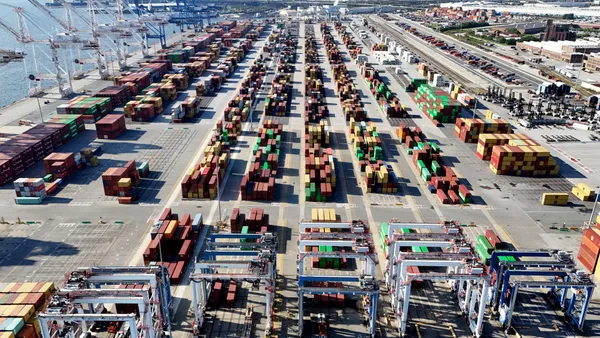Dive Brief:
- The Rhode Island Department of Transportation (RIDOT) began targeting tractor trailers with electronic tolls on Monday, the first state to implement a truck-specific toll.
- The toll is implemented through 2016 legislation called RhodeWorks, which aims to repair Rhode Island roads and bridges by 2025. RhodeWorks forbids tolls on cars and small trucks, and estimates that truck tolls will fund one-tenth of its $4.9 billion budget.
- Tolls are collected at two locations now, set to increase to 12 locations over the next 18 months at areas near the bridges to be repaired with the new revenue.
Dive Insight:
Rhode Island's new truck-targeting tolls intend to channel funds to infrastructure repair, but trucking associations claim the fees will have a negative impact that ripples down the supply chain.
Since trucks cause the greatest damage to infrastructure they ought to pay the toll, RIDOT reasons in a press release. The tolls cost $3.25 and $3.50 at the first two locations, respectively, and are only charged once per day, per direction.
But trucks make up only 2% of traffic on the tolled highways and shouldn't be expected to foot the entire bill for infrastructure repair, the American Trucking Associations (ATA) protested in a press release. Plus, ATA claimed, the tolls will simply encourage truckers to take longer side routes rather than the highways.
“[Study] after study has shown that when new tolls are imposed, traffic simply diverts away from them — thus taking traffic off of the interstates and putting it on Main Street,” said Christopher Maxwell, president of the Rhode Island Trucking Association, according to the ATA release.
“They will reroute if the cost of the toll is greater than the cost to reroute," John Kearney, CEO of Advanced Training Systems, told Supply Chain Dive in an email. "Time is also a factor…. if the reroute takes extra time, that cost must be factored in.”
If trucks start avoiding toll roads, toll fees may not be sufficient for infrastructure repair, and could have consequences for the rest of the economy. Spear claimed as much as 30% of the toll revenue would go to government overhead costs. Maxwell said 94% of the costs of the tolls would fall on Rhode Island businesses.
"Everything we eat, drink, wear watch and drive is delivered by truck," Maxwell said, as reported by FreightWaves. "It’s going to hurt our economy.”












